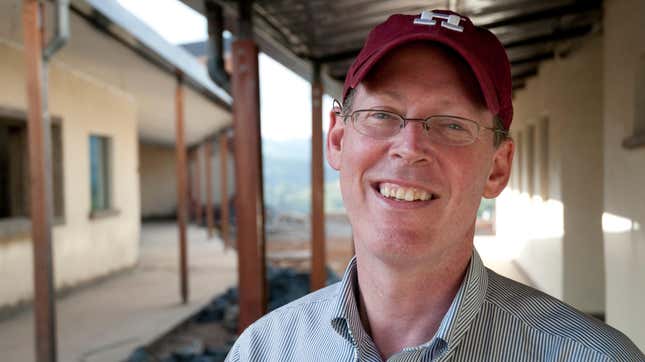
Dr. Paul Farmer, a widely respected figure in the world of public health, died on Monday at the age of 62, according to a statement from the charity he cofounded, Partners in Health. Farmer passed away in his sleep in Butaro, Rwanda, though a cause hasn’t been announced.
“Paul Farmer’s loss is devastating, but his vision for the world will live on through Partners in Health. Paul taught all those around him the power of accompaniment, love for one another, and solidarity. Our deepest sympathies are with his family,” said Dr. Sheila Davis, the CEO of Partners In Health said in a statement on Monday.
Farmer first became an internationally recognized figure in the late 1990s, when he brought attention to inequalities in how health care was administered around the world. Disturbingly, it was well within mainstream opinion in U.S. health care circles at the time that some people in the global south simply weren’t worth expending resources on because of technological and so-called “cultural” barriers.
Farmer was working in Haiti on the HIV crisis when he first caught the attention of U.S. media with a supposedly radical idea: People in Haiti deserve the same high-quality health care treatments as people in wealthy countries.
“One of the biggest set of myths we’re dealing with are about therapy for HIV, right?” Farmer told PBS Newshour in 2003.
“‘It can’t be done in a place like this [...] They don’t have a concept of time, they don’t have wristwatches, the medications have to be refrigerated, it’s not cost-effective, it’s not anything you could ever initiate in a really poor country’,” Farmer said, rattling off the long list of excuses he heard from some people in public health for why it wasn’t worth delivering high-quality health care to Haiti.
Obviously mainstream opinion in the U.S. has largely caught up with Farmer’s radical ideas of health care equality, at least in principle, but many of his ideas on social justice are still fought against by reactionary forces around the world. Farmer didn’t just advocate for providing health care for the world’s poorest people, he talked about the root causes of poverty and the kinds of systemic changes needed to address them.
Farmer was the author of several books, including Infections and Inequalities: The Modern Plagues from 1999 and Pathologies of Power: Health, Human Rights and the New War on the Poor from 2003.
Farmer, who was born in Massachusetts and raised in Florida, helped put public health struggles into a historical context, something that was so rarely done by elite Americans in the field of public health as recently as the early 2000s.
From Farmer’s Pathologies of Power:
In examining tuberculosis in Haiti, for example, our analysis must be historically deep—not merely deep enough to recall an event such as that which deprived most of my patients of their land, but deep enough to remember that modern-day Haitians are the descendants of a people enslaved in order to provide our ancestors with cheap sugar, coffee, and cotton.
Our analysis must be geographically broad. In this increasingly interconnected world (“the world that is satisfying to us is the same world that is utterly devastating to them”), we must understand that what happens to poor people is never divorced from the actions of the powerful. Certainly, people who define themselves as poor may control their own destinies to some extent. But control of lives is related to control of land, systems of production, and the formal political and legal structures in which lives are enmeshed. With time, both wealth and control have become increasingly concentrated in the hands of a few. The opposite trend is desired by those working for social justice.
Farmer is survived by his wife and three children.